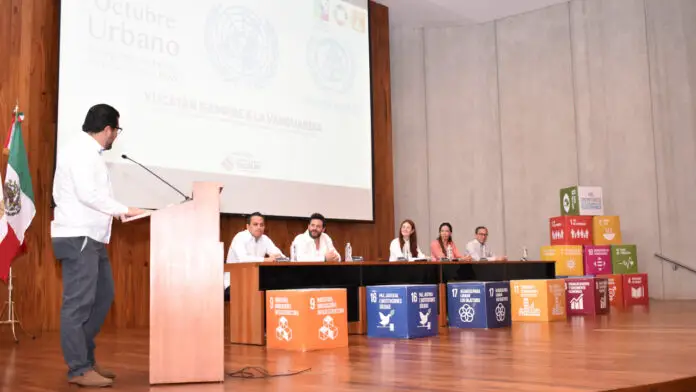Specialists from Latin America, national and local, gathered in Mérida, Yucatán to share their experience and discuss best practices and regional trends in land use planning and sustainable urban development during the forum “Challenges and Opportunities in Building Sustainable Cities and Communities,” organized by UN Habitat.
Around 350 people interested in Land Use Planning, Urban Development, and the Environment attended the event at the Hno. Pablo Hernández García Auditorium of the Marist University. There was a large attendance of students, mainly from the Architecture and Habitat Design programs, who engaged directly with authorities and specialists. Additionally, councilors, local municipal authorities, officials, and consultants from other cities attended to share their experiences regarding the implementation of instruments for sustainable urban development.
The opinions expressed in the Inaugural Plenary “Challenges and Opportunities, the Challenge of the New Urban Agenda” agreed that well-planned urbanization is a transformative force to accelerate the achievement of the Sustainable Development Goals. Furthermore, the challenges and opportunities faced by cities and communities in the State of Yucatán concerning the implementation of the New Urban Agenda were discussed.
In this context, in the keynote session by Dr. Ignacio Kunz, “Experiences and Paradigm Shifts for Sustainable Urban Development,” the UNAM researcher evaluated the land use planning processes in Mexico and their challenges to achieve sustainability-oriented urban growth.
In the session “Where Yes and Where No? Keys to the Location of Adequate Housing,” the necessary elements for proper urban planning and the regulation of real estate developments in Yucatán were discussed. The conversation included local actors such as Carlos Viñas Heredia, General Director of the Yucatán State Housing Institute; Sergei López Cantón, President of the National Chamber of the Housing Development and Promotion Industry Yucatán; Sergio Martínez León, Vice President of the Mexican Association of Municipal Planning Institutes; Claudia Mondragón Rivera, Specialist in Participatory Urbanism at UN-Habitat Mexico, and Nayely Balam Chan, Delegate of the National Workers’ Housing Fund Institute in Yucatán.
The next session titled “Environmental and Urban Justice in Building Sustainable Cities” aimed to reflect on how to ensure the protection of environmental and urban rights, as well as the conservation and development of sustainable cities. Emphasis was placed on the role of a Prosecutor’s Office that guarantees these rights and the scope according to its powers.
Moderated by Sayda Rodríguez Gómez, Secretary of Sustainable Development, the interventions were led by lawyers: Víctor Ramírez Navarro, legislative advisor and professor at UNAM; Miguel Ángel Cancino, former Environmental and Land Use Planning Prosecutor of Mexico City, and William Gómez Hueso, legal consultant from Guadalajara, who agreed on the importance of advancing governance for sustainability.
In the session “Partnerships for the Implementation of Metropolitan Agendas,” moderated by Héctor Sánchez Tirado, Director of Mobility of the Institute of Mobility and Territorial Urban Development, arguments were made about the importance of collaboration and cooperation between different levels of government, local, regional actors, and civil society to successfully implement Metropolitan Agendas.
Expert opinions were heard from Gerardo González Herrera, legal consultant from Jalisco; Omar Aréizaga, Director of Metropolitan Planning and Zoning at the Secretariat of Agrarian, Territorial, and Urban Development; and Silvana Forti, Director of the Urban Laboratory at Universidad Modelo.
Towards the end of the day, Eugenia de Grazia, Program Officer for UN-Habitat Mesoamerica, celebrated the reflections shared at the forum, highlighting the curiosity and originality of the Yucatecan community. She reaffirmed UN-Habitat’s willingness to continue collaborating with the State Government. This activity was organized as part of the urban strategy promoted by Governor Mauricio Vila through the strengthening of regulations in land use planning and sustainable urban development.
Source: ONU Habitat






